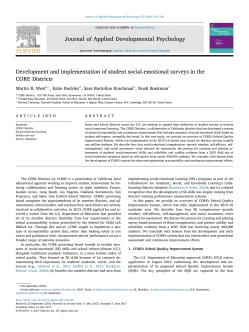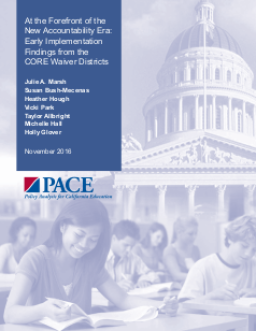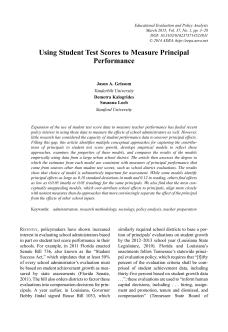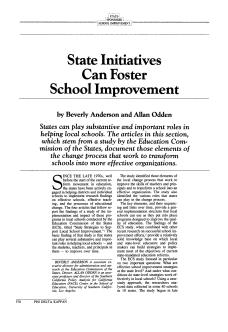Published
Summary
States and school districts across the U.S. are seeking to expand their definition of student success to include social-emotional learning. The CORE Districts, a collaborative of California districts that has developed a system of school accountability and continuous improvement that includes measures of social-emotional skills based on student self-reports, exemplify this trend. In this case study, we provide an overview of CORE's School Quality Improvement System, which was implemented in the 2015–16 school year across six districts serving roughly one million students.
Insights From California’s CORE Waiver Districts
Published
Summary
California's Local Control Funding Formula (LCFF) aims to improve educational equity by providing additional funds to districts with disadvantaged students. Districts are required to engage with their communities and develop Local Control Accountability Plans (LCAPs) to identify priorities and allocate funds. However, there are concerns about the quality of LCAPs, lack of stakeholder involvement, and limited transparency. To improve the effectiveness of LCFF, districts must ensure meaningful stakeholder engagement and use data to guide decision-making.
Learning from the CORE Districts' Focus on Measurement, Capacity Building, and Shared Accountability
Published
Summary
California and the US are undergoing a cultural shift in school accountability policies towards locally-determined measures of school performance. Lessons can be learned from the CORE districts, which developed an innovative accountability system, emphasizing support over sanctions, and utilizing multiple measures of school quality. The CORE districts' measurement system and collaboration hold promise for improving local systems, but efforts to build capacity remain a work in progress.
Published
Summary
This article examines the use of student test score data to measure the effects of school principals on student achievement. Multiple models are developed and compared using data from a large urban school district, with results showing the importance of model choice for accurately assessing principal effects. The most conceptually unappealing models that over-attribute school effects to principals align more closely with nontest measures than do approaches that more convincingly separate the effect of the principal from the effects of other school inputs.
Published
Summary
States can help local schools improve by implementing effective school improvement strategies. A study by the Education Commission of the States (ECS) identified key elements that can transform schools into more effective organizations, and various roles that states can play in the change process. The study analyzed data collected in 40 schools in 10 states, providing a solid knowledge base for implementing state-mandated education reforms. Effective strategies and conditions for success were studied using a case-study approach. The study began in late 1983 and was completed in early 1985.




